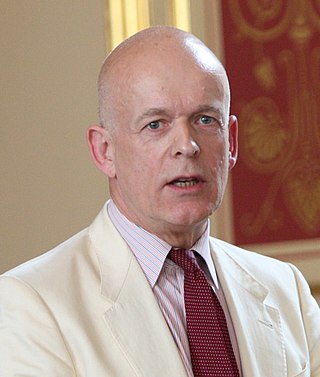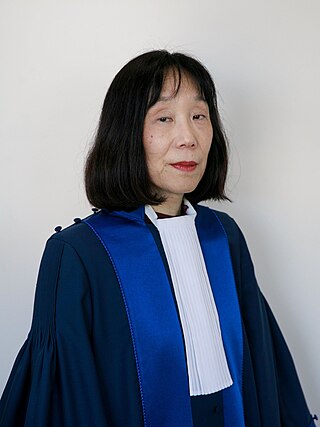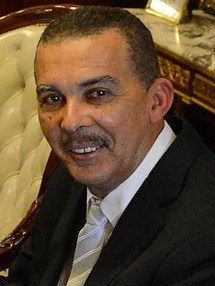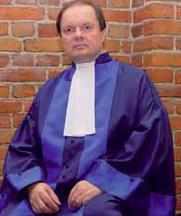Related Research Articles

The International Criminal Court is an intergovernmental organization and international tribunal seated in The Hague,Netherlands. It is the first and only permanent international court with jurisdiction to prosecute individuals for the international crimes of genocide,crimes against humanity,war crimes and the crime of aggression. The ICC is distinct from the International Court of Justice,an organ of the United Nations that hears disputes between states.

Theodor Meron,is an American-Israeli lawyer and judge. He served as a judge of the International Criminal Tribunal for the former Yugoslavia (ICTY),International Criminal Tribunal for Rwanda (ICTR),and the International Residual Mechanism for Criminal Tribunals (Mechanism). He served as President of the ICTY four times and inaugural President of the Mechanism for three terms (2012–19).

Jean-Pierre Bemba Gombo is a politician in the Democratic Republic of the Congo (DRC). After he served as Deputy Prime Minister of Defense 2023 to 2024,he was moved to the Deputy Prime Minister of Transportation. He was previously one of four vice-presidents in the transitional government of the Democratic Republic of the Congo from 17 July 2003 to December 2006. He led the Movement for the Liberation of the Congo (MLC),a rebel group turned political party. He received the second-highest number of votes in the 2006 presidential election. In January 2007,he was elected to the Senate.

The International Criminal Court has opened investigations in Afghanistan,the Central African Republic,Côte d'Ivoire,Darfur in Sudan,the Democratic Republic of the Congo,Kenya,Libya,Uganda,Bangladesh/Myanmar,Palestine,the Philippines,and Venezuela. Additionally,the Office of the Prosecutor conducted preliminary examinations in situations in Bolivia,Colombia,Guinea,Iraq / the United Kingdom,Nigeria,Georgia,Honduras,South Korea,Ukraine and Venezuela. Preliminary investigations were closed in Gabon;Honduras;registered vessels of Comoros,Greece,and Cambodia;South Korea;and Colombia on events since 1 July 2002.

The states parties to the Rome Statute of the International Criminal Court are those sovereign states that have ratified,or have otherwise become party to,the Rome Statute. The Rome Statute is the treaty that established the International Criminal Court,an international court that has jurisdiction over certain international crimes,including genocide,crimes against humanity,and war crimes that are committed by nationals of states parties or within the territory of states parties. States parties are legally obligated to co-operate with the Court when it requires,such as in arresting and transferring indicted persons or providing access to evidence and witnesses. States parties are entitled to participate and vote in proceedings of the Assembly of States Parties,which is the Court's governing body. Such proceedings include the election of such officials as judges and the Prosecutor,the approval of the Court's budget,and the adoption of amendments to the Rome Statute.

The eighteen judges of the International Criminal Court (ICC) are elected for nine-year terms by the member-countries of the court. Candidates must be nationals of those countries and they must "possess the qualifications required in their respective States for appointment to the highest judicial offices".

Sir Adrian Bruce Fulford is a retired Lord Justice of Appeal. From 2017 to 2019,he was the first Investigatory Powers Commissioner,and was the Vice-President of the Court of Appeal in 2019,succeeding Lady Justice Hallett.
Christine,Baroness Van den Wyngaert is a Belgian jurist and judge. She served as international and comparative criminal law expert from 2009 to 2018 as a judge on the International Criminal Court. She served in the Trial Division Chamber. On 8 July 2013,Van den Wyngaert was ennobled by King Albert II of Belgium as a baroness for her services as a judge. From 2003 to 2005 she was a Judge at the International Criminal Tribunal for the former Yugoslavia,and from 2000 to 2002 an ad hoc judge on the International Court of Justice.
Daniel David Ntanda Nsereko is a Ugandan judge and legal scholar. He was a member of the Appeals Chamber of the International Criminal Court (ICC) from 2008 to 2012,and currently serves as a judge on the Special Tribunal for Lebanon.
Mathieu Ngudjolo Chui is a colonel in the Congolese army and a former senior commander of the National Integrationist Front (FNI) and the Patriotic Resistance Force in Ituri (FRPI).
Callixte Mbarushimana is a Hutu Rwandan and former United Nations employee (1992–2001) who is alleged to have participated in the Rwandan genocide of 1994. On 28 September 2010,Mbarushimana was indicted by the International Criminal Court (ICC) in The Hague for crimes against humanity and war crimes allegedly committed in the Democratic Republic of the Congo in 2009. He was arrested in France in October 2010 and extradited to the ICC on 25 January 2011. However,he was released on 23 December 2011 as the ICC found there was insufficient evidence for prosecuting him.

Bruno Cathala is a French judge. Currently President of the Tribunal de Grande Instance in Évry,France,he was the first Registrar of the International Criminal Court,a post he held from 3 July 2003 to 9 April 2008.
Fatoumata DembéléDiarra is a Malian lawyer and judge. She was a judge of the International Criminal Tribunal for the former Yugoslavia (ICTY) and of the International Criminal Court (ICC).

The Presidency of the International Criminal Court is the organ responsible for the proper administration of the Court.
Six judges of the International Criminal Court were elected during the 10th session of the Assembly of States Parties to the Rome Statute of the International Criminal Court in New York between 12 and 21 December 2011. The judges elected,Anthony Carmona of Trinidad and Tobago,Miriam Defensor Santiago of the Philippines,Chile Eboe-Osuji of Nigeria,Robert Fremr of the Czech Republic,Olga Venecia Herrera Carbuccia of the Dominican Republic and Howard Morrison of the United Kingdom,took office on 11 March 2012.
A special election for three judges of the International Criminal Court was held during the 6th session of the Assembly of States Parties to the Rome Statute of the International Criminal Court in New York on 30 November and 3 December 2007.

The Assemblée des francophones fonctionnaires des organisations internationales (AFFOI),French for the Assembly of French speaking international civil servants,is a global network of French-speaking international civil servants.

Anthony Thomas Aquinas Carmona is a Trinidadian politician who was the fifth President of Trinidad and Tobago from 2013 to 2018. Previously,he was a High Court Judge at the Supreme Court of Trinidad and Tobago,and he served as a Judge of the International Criminal Court from 2012 to 2013.

Erkki Antero Kourula is a Finnish judge who served on the International Criminal Court (ICC).
Fumiko Saiga was a Japanese diplomat and was the first Japanese person and Asian woman to serve as a judge on the International Criminal Court. Her work focused on human rights and gender equality. As a politician,she was the Lieutenant Governor of Saitama Prefecture from 1998-2000.
References
- ↑ "Assembly of States Parties to the Rome Statute of the International Criminal Court – Sixth session – New York, 30 November - 14 December 2007 – Official Records – Volume I" (PDF). International Criminal Court. p. 12. Retrieved 27 August 2024.
- 1 2 "Judge Bruno Cotte". International Criminal Court. Retrieved 27 August 2024.
